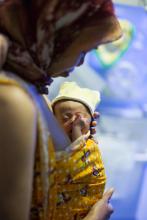Each year an estimated 2.7 million babies die during the first 28 days of life and over a million children survive with impairment following neonatal conditions. The main causes of neonatal death are complications of prematurity (36%), infections (23%), and intrapartum complications (23%). Many of these deaths are preventable. To prevent newborn death and disability requires health systems to deliver routine newborn care (cleanliness, thermal care and support for breastfeeding) for all babies, newborn resuscitation and prevention of mother to child transmission of HIV (PMTCT) within all facilities for all babies who need it; and timely provision of high quality inpatient care for babies born small and sick.
The CHIFA Newborn Care Project convened all stakeholders to explore and address how to improve quality of care for newborns within the overall care continuum, particularly for those born small and sick in low and middle-income countries, contributing to global efforts such as the World Health Organization led Quality, Equity Dignity (QED) efforts for women and newborns that build on technical and advocacy work of Every Newborn Action Plan (ENAP). The ENAP, a multi-partner initiative backed by a World Health Assembly Resolution, has set national targets of <12 neonatal deaths per 1000 live births, and <12 stillbirths per 1000 total births by 2030 as part of the Sustainable Development Goals.


